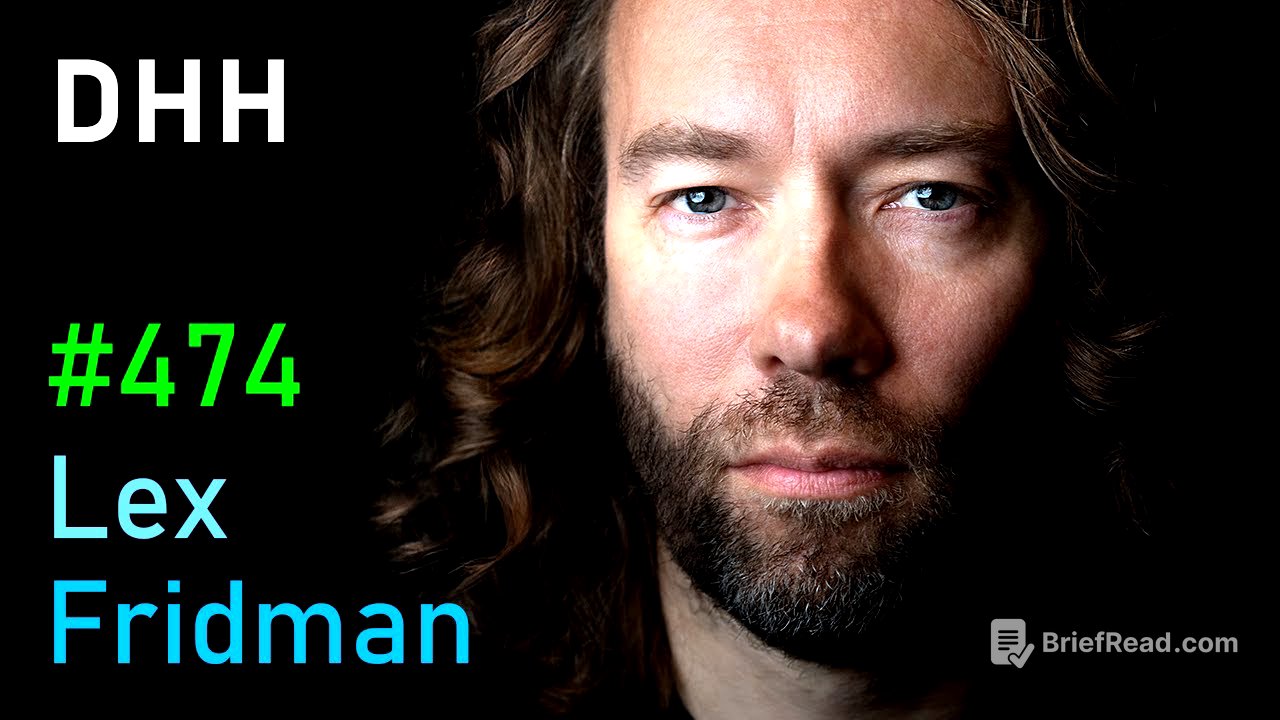TLDR;
This conversation with David Heinemeier Hansson (DHH) covers a wide range of topics, from his early struggles with programming to the future of AI and the importance of open source. Key takeaways include:
- The significance of programmer happiness and developer ergonomics in language design, as exemplified by Ruby.
- A critique of the complexity and churn in the JavaScript ecosystem.
- The benefits and drawbacks of cloud computing, with a case study of 37signals' decision to leave AWS.
- The importance of small, focused teams and the dangers of excessive management.
- The value of hard work, continuous learning, and maintaining a balance between ambition and personal life.
Episode highlight [0:00]
Cookie banners are universally hated and ineffective, yet they persist globally. Web pages remain fundamentally similar to those of the late 90s, primarily functioning as forms writing to databases. Many developers feel like "CRUD monkeys" and overcomplicate systems to compensate. The satisfaction of race car driving comes from pushing the car to the edge of adhesion, balancing danger and skill.
Introduction [1:21]
David Heinemeier Hansson (DHH), creator of Ruby on Rails, co-owner and CTO of 37signals, and race car driver, is introduced. He is also a New York Times best-selling author of four books.
Programming - early days [2:32]
DHH recounts his initial failures learning to program on an Amstrad 464, lacking understanding of variables and struggling with printed source code from magazines. He later attempted Easy Amos on the Amiga 500 but still couldn't grasp programming concepts. He became involved in the Amiga demo scene and ran a bulletin board system (BBS) at age 14, trading pirated software. His interest in programming was rekindled in ninth grade with HTML, leading to creating gaming websites and eventually learning PHP, which finally made programming "click" for him.
JavaScript [19:57]
Rails 8 aims to recapture the ease of web development from the 90s by eliminating the need for build processes. DHH expresses his dislike for the JavaScript scene, particularly the churn and complexity of its frameworks and tooling from 2010 to 2020. He believes browsers have improved, making pre-processing unnecessary and allowing for a better development experience with plain JavaScript files.
Google Chrome and DOJ [30:16]
DHH acknowledges Chrome's positive impact on web development due to Google's investment in the open web. He opposes the DOJ's attempt to split up Chrome and Google, arguing that Chrome won on its merits and that antitrust efforts should focus on more pressing issues like mobile app store monopolies. He criticizes the EU's GDPR for resulting in universally hated cookie banners that fail to protect privacy.
Ruby programming language [38:03]
PHP taught DHH the basics of web application development, but he didn't fall in love with it. He was hired by Jason Fried to work on Basecamp and had the freedom to choose the technology. He discovered Ruby through Dave Thomas and Martin Fowler's writings and was drawn to its readability and focus on human communication.
Beautiful code [45:14]
Ruby's design prioritizes programmer happiness and code aesthetics, removing unnecessary line noise and abbreviations. Examples include Ruby's initialization method (def initialize) compared to Python's (def __init__(self)), and Ruby's flexible if conditional syntax. Ruby allows extending base classes, trusting programmers to add their own methods.
Metaprogramming [1:03:15]
Metaprogramming in Ruby allows adding keywords to the language, creating domain-specific languages (DSLs) that tailor Ruby to specific tasks. Active Record in Rails uses metaprogramming to define relationships in a database at an object level.
Dynamic typing [1:06:36]
DHH defends dynamic typing in Ruby, arguing that it enables metaprogramming and avoids the repetition and boilerplate of static typing. He believes static typing's benefits, such as easier tooling and bug detection, are not worth the aesthetic cost and limitations. He prefers unit and integration testing to catch bugs.
Scaling [1:13:55]
Shopify, a large-scale e-commerce platform, demonstrates that Ruby and Rails can scale without static typing. Shopify processes a million dynamic requests per second on Black Friday. DHH argues that scaling Ruby is an economic question, and improving programmer productivity is more important than squeezing extra cycles out of the CPU. Ruby is a "luxury language" that prioritizes programmer happiness and productivity.
Future of programming [1:26:47]
DHH believes AI should generate human-readable code to facilitate collaboration. He prefers using AI as a pair programmer, looking up APIs and getting second opinions, but still typing the code himself to maintain competence. He acknowledges AI's potential to automate much of coding, but emphasizes the importance of learning to program from scratch and developing "vibe coding" skills.
Future of AI [1:44:18]
DHH expresses skepticism about predictions that AI will write 90% of code by the end of the year. He suggests that manual programming may become a recreational activity, like horseback riding. He emphasizes the importance of gratitude for past opportunities and positioning oneself for future reskilling.
Vibe coding [1:50:13]
DHH defines "vibe coding" as generating code with AI and then fixing it through prompts and manual edits. He suggests balancing vibe coding with writing code from scratch to develop both skills. He uses AI as a tool to explain concepts and get second opinions, but still prefers to type the code himself to retain competence.
Rails manifesto: Principles of a great programming language [1:58:45]
DHH outlines the principles of a great programming language and framework, including optimizing for programmer happiness, adhering to the principle of least surprise, prioritizing convention over configuration, providing a full menu of pre-assembled components, and embracing a remix of different programming paradigms. He emphasizes the importance of beautiful code and domain-specific languages.
Why managers are useless [2:23:11]
DHH argues against the need for engineering managers in small to medium-sized companies, believing they often create more problems than they solve. He emphasizes the importance of programmers working under and with someone better at their job and having long stretches of uninterrupted time. He advocates for small teams of highly skilled individuals without management layers.
Small teams [2:32:32]
DHH emphasizes that small teams are more efficient and agile. He states that Basecamp's default team size is two people: one programmer and one designer. He argues that small teams can "just do" without needing to plan or argue.
Jeff Bezos [2:38:39]
DHH discusses how Basecamp has successfully stayed small by not taking venture capital. He recounts how Jeff Bezos invested in Basecamp by buying secondaries, providing DHH and Jason Fried with financial security and a vote of confidence. He shares Bezos's advice to "just keep doing awesome stuff" and expresses regret for later criticizing Amazon.
Why meetings are toxic [2:53:57]
DHH emphasizes the importance of minimizing meetings and maximizing uninterrupted work time. He notes that he and Jason Fried have spent very little time in meetings over their 24-year partnership. He stresses the importance of having a family and building a whole life outside of work.
Case against retirement [3:01:43]
DHH argues against the idea of retirement, believing that ambitious people need to continue working and creating. He cites Mihaly Csikszentmihalyi's concept of "flow" as essential to happiness. He emphasizes the importance of finding a balance between work and personal life.
Hard work [3:09:00]
DHH acknowledges that hard work is necessary but emphasizes the importance of enjoying the process and finding meaning in one's work. He values the responsibility and challenge of building something and the satisfaction of seeing it succeed.
Why we left the cloud [3:14:38]
DHH explains 37signals' decision to leave the cloud, citing high costs and a desire to return to a more decentralized internet. He notes that the cloud's promises of ease, speed, and cost savings did not hold true for their business.
AWS [3:17:48]
DHH details the specifics of 37signals' exit from AWS, highlighting the complexity and cost of cloud services. He emphasizes that owning their own hardware has allowed them to save millions of dollars and regain control over their infrastructure.
Owning your own servers [3:27:07]
DHH discusses the benefits of owning your own servers, including cost savings, autonomy, and the satisfaction of working with physical hardware. He mentions the possibility of home labbing, installing server hardware in one's own apartment.
Elon Musk [3:33:19]
DHH admires Elon Musk's audacious goals and ability to attract top talent. He believes Musk's success stems from his clear vision, meritocratic approach, and ability to simplify complex problems.
Apple [3:43:01]
DHH discusses his past love for Apple and his disappointment with the company's current direction. He criticizes Apple's app store policies and believes the company has lost its way due to a focus on profits over innovation.
Tim Sweeney [3:54:48]
DHH praises Tim Sweeney and Epic Games for their fight against Apple's app store policies. He believes their victory has benefited the entire developer ecosystem.
Fatherhood [4:06:22]
DHH discusses the transformative impact of fatherhood on his life. He emphasizes the importance of finding a partner and building a family, noting that it has brought him a level of joy and meaning he never expected.
Racing [4:32:04]
DHH recounts his journey into race car driving, starting at age 27. He describes the physical sensations, the mental focus, and the balance of danger and skill that make racing so addictive.
Cars [4:59:08]
DHH shares his passion for cars, particularly the Pagani Zonda HH. He discusses the thrill of driving fast and the importance of responsible driving.
Programming setup [5:04:26]
DHH describes his current programming setup, which includes Linux, a low-profile mechanical keyboard (Lowfree Flow 84), a Logitech MS3 mouse, and NeoVim as his text editor. He emphasizes the importance of customizing one's development environment and using tools that enhance productivity and enjoyment.
Programming language for beginners [5:19:35]
DHH recommends Ruby as a great starting language for beginners due to its simplicity and readability. He also suggests learning JavaScript for web development and Go for low-level tasks like writing HTTP proxies.
Open source [5:32:53]
DHH shares his philosophy on open source, emphasizing the importance of building for oneself and treating contributions as gifts. He rejects the notion that open source is in crisis and criticizes the expectation that open source developers are owed money for their work.
WordPress drama [5:41:46]
DHH discusses the controversy surrounding WordPress founder Matt Mullenweg and his conflict with WP Engine. He defends the principles of open source and criticizes Mullenweg for attempting to extract value from companies that have built successful businesses on top of WordPress.
Money and happiness [5:53:03]
DHH reflects on the relationship between money and happiness, noting that while money can solve certain problems, it does not guarantee fulfillment. He emphasizes the importance of finding flow, building meaningful relationships, and pursuing one's passions.
Hope [6:01:56]
DHH expresses optimism about the future of humanity, believing in our capacity to solve problems and build a better world. He encourages intellectual humility and emphasizes the importance of cultivating compassion and kindness.









